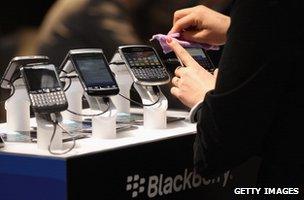Nokia drops Blackberry ban threat after patent deal
- Published

Nokia had sought to have Blackberry handsets banned in three countries
Nokia has struck a patent licensing deal with Research In Motion, ending the Finnish company's effort to ban Blackberry handsets from sale.
Nokia had asked courts in the US, UK and Canada to take action after a tribunal ruled that RIM should be paying a fee to include a common type of wi-fi connectivity on its devices.
The Lumia phonemaker said RIM had now agreed to pay both a one-off charge and ongoing payments.
It coincides with weak profits at RIM.
The Canadian firm has just reported a $9m (£5.5m) profit for its last quarter - that does not take account of the sum owed to Nokia.
The figure marked a steep drop from last year's $265m for the same period.
RIM also announced its number of global subscribers had fallen by one million over the three months - the first such drop. It said it now had 79 million subscribers.
Arbitration ruling
Nokia's clash with RIM centred on wireless local area network (Wlan) connections to the internet. All of RIM's handsets and tablets use it,
RIM had argued an earlier licensing deal with Nokia meant it should not have to pay additional royalty fees to use the technologies, However, an arbitration ruling by Sweden's Stockholm Chamber of Commerce in September went in the European company's favour.
Nokia already earned about 500m euros ($660m; £406m) from existing intellectual property licences.
"We are very pleased to have resolved our patent licensing issues with RIM and reached this new agreement, while maintaining Nokia's ability to protect our unique product differentiation," said Paul Melin, Nokia's chief intellectual property officer.
He did not disclose the sums involved.
RIM's chief legal officer indicated that the move resolved a potential distraction for his firm.
"This agreement further demonstrates RIM's effort to effectively resolve the patent complexities that face our industry," said Steve Zipperstein.
"With these lawsuits out of the way, we will continue to focus on delivering BlackBerry 10 in the next calendar quarter."
One UK-based patent attorney said the news was not unexpected.
"After the tribunal ruling it was inevitable that RIM would need to do a licensing deal with Nokia," said Andrew Alton, from Urquhart-Dykes & Lord.
"The threat of a sales ban on RIM's upcoming Blackberry 10 phones - which could potentially save the business - would have been too great a danger. Leaving out Wlan connectivity is not a realistic option as users increasingly rely on wi-fi for much of their data use."
- Published20 December 2012
- Published19 December 2012
- Published28 November 2012